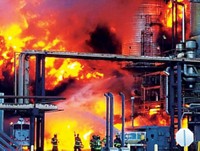Advertisement
Grab your lab coat. Let's get started
Welcome!
Welcome!
Create an account below to get 6 C&EN articles per month, receive newsletters and more - all free.
It seems this is your first time logging in online. Please enter the following information to continue.
As an ACS member you automatically get access to this site. All we need is few more details to create your reading experience.
Not you? Sign in with a different account.
Not you? Sign in with a different account.
ERROR 1
ERROR 1
ERROR 2
ERROR 2
ERROR 2
ERROR 2
ERROR 2
Password and Confirm password must match.
If you have an ACS member number, please enter it here so we can link this account to your membership. (optional)
ERROR 2
ACS values your privacy. By submitting your information, you are gaining access to C&EN and subscribing to our weekly newsletter. We use the information you provide to make your reading experience better, and we will never sell your data to third party members.
Safety
Texas Tech Overhauls Lab Safety
Investigation: Internal report grows from January accident
by Jeff Johnson
July 23, 2010
Following a five-month internal review, officials at Texas Tech University in Lubbock, released a report on July 23 laying out a framework to improve laboratory safety at the university. The review was triggered by a serious accident that occurred on Jan. 7 in a campus chemistry laboratory. The accident critically injured a student researcher (C&EN, Feb. 1, page 25).
The report's recommendations were drawn up by a working group chaired by Alice Young, faculty fellow for research integrity in the Office of Vice President for Research. Young is also a professor of psychology and of pharmacology and neuroscience.
The six-page report is a series of recommendations intended to improve lab safety and elevate the importance of safety culture at the university. The recommendations are not proscriptive and are somewhat general. It will be left to a newly created university-wide Research Safety Committee to implement most of them.
The safety committee will be led by Young. As of September, the university's Environmental Health & Safety Department (ES&H), which oversees research lab safety at the university, will report to Young.
Young stresses that research in the physical sciences and engineering is quickly growing at Texas Tech and the university must determine whether and where to put more resources into safety needs, driven by that growth.
The need to concentrate safety in one area is important to the head of the campus ES&H department, who was a working group member, Young says. "He put an all-university safety committee high on his wish list of ways to raise consciousness about good safety practices that already exist in one part of the university and encourage their export in ways that will help improve our safety culture across the university."
In that same vein, she notes that the report urges creation of an external peer review panel that will, over the next academic year, assess campus lab safety practices and advise the university on how these practices can be improved. The panel, Young continues, will consider the level and direction of resources that are committed to lab research safety.
Other recommendations in the report include forming a campus safety ombudsman to respond to issues and deficiencies raised by researchers and students and to speed their correction.
Many of the recommendations will require further examination by the new research safety committee and various department faculty. These could include considering lab safety and training when making faculty tenure and promotion decisions; developing a system to prioritize ES&H oversight by the level of hazardous materials labs handle or their past history of safety compliance; clarification of safety oversight responsibility and making clear that the campus environmental safety & health office has authority to close a lab; and ensuring that all researchers take campus safety training courses.
The report also takes note of difficulties the campus has had in filling open positions in the EH&S office and recommends that the university consider creating a certification program in laboratory safety. The report notes that only five undergraduate and 25 graduate programs in the U.S. offer industrial hygiene degrees.
Texas Tech also conducted a separate internal investigation of the actual cause of the January accident but that report has not been made public. The Chemical Safety & Hazard Investigation Board (CSB) is investigating the Texas Tech accident and is considering conducting a general review of safety practices at educational lab facilities.
CSB's Texas Tech accident report has been drafted and is undergoing internal board review, a CSB official says. It should be finalized in the fall. The report, however, will be short--more of a bulletin, the official adds.
The board has had to put off a longer review of university safety practices due to CSB increased workload and shifting priorities, driven, particularly, by its decision to investigate the BP DeepWater Horizon oil rig spill.



Join the conversation
Contact the reporter
Submit a Letter to the Editor for publication
Engage with us on Twitter